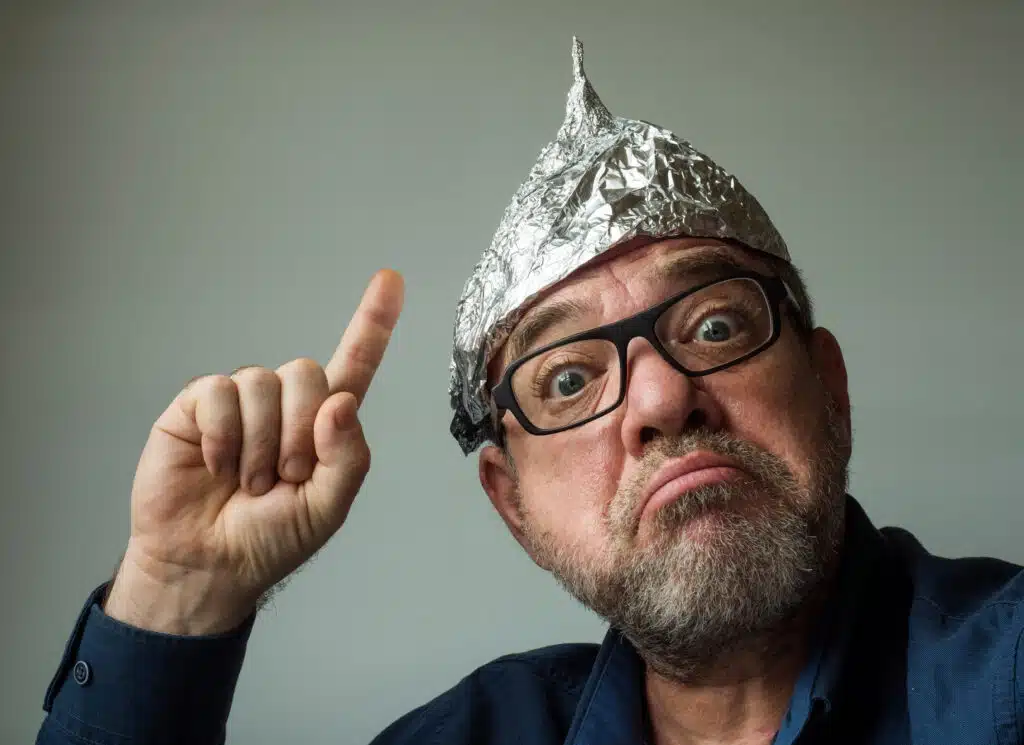In a world shaped by diverse beliefs and perspectives, there exists a curious phenomenon where individuals staunchly adhere to certain notions despite a scarcity of concrete evidence. From UFO sightings and mystical practices to ancient mysteries and pseudoscientific phenomena, people often embrace ideas that defy conventional scrutiny.
1. UFO Sightings and Extraterrestrial Encounters

Despite the lack of concrete evidence, numerous individuals are convinced that UFO sightings and encounters with extraterrestrial beings are actual. These beliefs often stem from eyewitness accounts, blurry photographs, and anecdotal stories. While some argue that governments are concealing the truth, skeptics maintain that these occurrences can be attributed to natural phenomena or human-made objects. The allure of the unknown continues to fuel these convictions, creating a divide between believers and skeptics in the ongoing debate about extraterrestrial life.
2. Cryptids and Mythical Creatures

People across the globe fervently believe in the existence of cryptids and mythical creatures, even though scientific evidence remains elusive. From Bigfoot in North America to the Loch Ness Monster in Scotland, these legendary beings captivate the imagination. Eyewitness testimonies, blurry photographs, and ambiguous footprints often form the foundation for these convictions. While enthusiasts argue that these creatures are elusive and intelligent, skeptics attribute the sightings to misidentifications, hoaxes, or the power of folklore passed down through generations.
3. Paranormal Activities and Ghostly Encounters

The belief in paranormal activities and ghostly encounters persists despite a lack of empirical evidence. Individuals recounting personal experiences, such as unexplained noises or eerie apparitions, contribute to the conviction that spirits inhabit our world. While paranormal investigators employ various tools and techniques, scientific validation remains elusive. Skeptics argue that psychological factors, environmental conditions, and cultural influences play a significant role in shaping these beliefs, emphasizing the importance of critical thinking when interpreting supernatural occurrences.
4. Alternative Medicine and Healing Practices

Some people remain convinced of the efficacy of alternative medicine and healing practices, despite limited scientific support. From crystals and energy healing to herbal remedies, these methods often lack rigorous empirical validation. Believers emphasize personal anecdotes and historical use, asserting that conventional medicine fails to address holistic well-being. On the other hand, skepticism argues for evidence-based medicine, cautioning against the potential risks of relying on unproven treatments. The ongoing debate underscores the complex relationship between traditional practices and modern healthcare.
5. Conspiracy Theories Surrounding Historical Events

Conspiracy theories surrounding significant historical events persist despite the overwhelming consensus among historians and experts. From moon landings to assassinations, alternative narratives challenge established truths. Proponents often cite inconsistencies, perceived cover-ups, and hidden agendas as evidence, fostering a distrust in official accounts. Skeptics maintain that these theories lack credible support and thrive on skepticism towards authority. The enduring appeal of conspiracy theories highlights a broader cultural phenomenon where skepticism intersects with a deep-seated mistrust of official narratives.
6. Numerology and Cosmic Significance

Numerology, the belief in mystical significance assigned to numbers, continues to capture the fascination of many despite its lack of empirical validation. Enthusiasts find patterns in numbers, linking them to cosmic events and personal destinies. While some argue that these connections offer profound insights, skeptics dismiss numerology as pseudoscience, emphasizing the arbitrary nature of numerical interpretations. The enduring popularity of numerology highlights the human tendency to seek meaning and order in the seemingly random patterns of life.
7. Psychic Predictions and Clairvoyant Insights

The conviction in psychic abilities and clairvoyant predictions endures, fueled by personal testimonials and popular culture. Individuals often turn to psychics for insights into their future, relationships, or career paths. Despite lacking scientific validation, believers find solace in the perceived accuracy of these readings. Skeptics point to cognitive biases and the absence of controlled studies, urging caution against placing too much trust in paranormal predictions. The ongoing debate underscores the enduring allure of mysticism in a world shaped by uncertainty.
8. Ancient Aliens and Lost Civilizations

The belief that ancient civilizations had extraterrestrial influences persists, with some arguing that advanced beings guided human development. Despite limited archaeological evidence, proponents point to ancient texts, mysterious structures, and unexplained phenomena as signs of alien intervention. Skeptics emphasize the cultural context and evolving understanding of history, cautioning against attributing gaps in knowledge to otherworldly forces. The fascination with ancient aliens reflects a human desire to uncover hidden truths about our past.
9. Power of Crystals and Energy Healing

The conviction in the healing powers of crystals and energy practices remains strong, attracting adherents seeking alternative therapies. Believers argue that crystals possess unique energies that promote physical and emotional well-being. While anecdotal evidence abounds, scientific support for these claims remains scarce. Skeptics emphasize the placebo effect and the need for rigorous studies to validate the efficacy of crystal healing. The ongoing debate highlights the intersection of spirituality, holistic wellness, and the pursuit of alternative healing modalities.
10. Astrology and Personal Horoscopes

Astrology, the belief that celestial positions influence human affairs and personalities, continues to shape the lives of many. People consult horoscopes for insights into their character, relationships, and future endeavors. Despite the lack of empirical evidence, enthusiasts find resonance in astrological descriptions. Skeptics argue for the lack of scientific basis and the generalizations inherent in astrological interpretations, urging individuals to approach horoscopes with a critical mindset. The enduring popularity of astrology underscores the enduring human fascination with the cosmos and its perceived impact on individual destinies.
10 Cliché Excuses People Make When Things Go Wrong
Photo Credit: Shutterstock
When faced with undesirable outcomes or failures, people often use common and overused excuses to justify or explain their circumstances. These cliché excuses have become so prevalent that they no longer hold much weight or provide genuine insights into the situation.
11 Things Everyone Should Have In Their House
Photo Credit: Shutterstock
Creating a safe and functional living space is a top priority for homeowners. Whether you’re a seasoned homeowner or starting, certain essential items should be present in every house. These items contribute to the overall safety and well-being of the residents and enhance convenience and preparedness for unforeseen circumstances. From safety equipment to practical tools, incorporating these essentials into your home ensures a comfortable and secure environment for you and your loved ones.
21 Reasons Why Reading Is Important
Photo Credit: Shutterstock
For as long as I can remember, reading has been my passion. I grew up in a home of readers who loved sharing books. My mom could not attend formal school at an early age as she and her family were interrupted by the horrors of Kristallnacht and the Holocaust.
For anyone who has had books taken away from them or who hasn’t yet developed a love of reading, there are 21 reasons why reading is essential.
10 Boomer Opinions That Non-Boomers Actually Agree With
Photo Credit: Shutterstock
In today’s world, people from different generations often find themselves at odds with one another, especially concerning matters of opinion. However, amidst these differences, there are certain viewpoints held by Baby Boomers that resonate with individuals from other age groups. These shared beliefs serve as a bridge, connecting the experiences and values of different generations.
10 Surprising Insecurities People Admit to Having
Photo Credit: Shutterstock
We all have our fair share of insecurities, those nagging doubts and fears that make us feel vulnerable and self-conscious. While common insecurities such as body image or public speaking anxieties are widely discussed, many unusual insecurities people admit to having often go unnoticed or unacknowledged.
This article was produced and syndicated by The Cents of Money.
Hi There!
With a passion for investing and personal finance, I began The Cents of Money to help and teach others. My experience as an equity analyst, professor, and mom provide me with unique insights about money and wealth creation and a desire to share with you.






